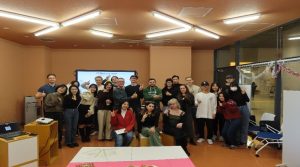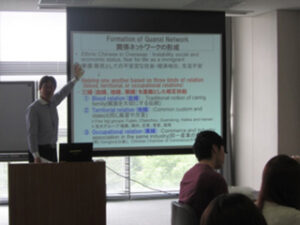Interactive workshops – Our consulting service since 2008
The original contextual management appraisal designed by Professor Rolf D. Schlunze and research group members is a useful tool for evaluating international managers’ preferences, interaction and performance (PIP Model). Through our interview and questionnaire surveys we achieved firm knowledge about contextual aspects, perceptions, networking and performance of international managers expatriated in overseas locations. Our group members have rich experiences and created manifold workshops and we glad to design tailor-made workshops for our clients. We provide managerial training for and with international managers in various fields as listed below.
- Cultural synergy creation and innovative teamwork
- Intercultural communication and negotiation
- Sustainable IHRM reconciling cultural values for interculturality
- Cross-cultural management and business ethics
- IT security and customer relations
The aim of our training is to develop the awareness and intercultural competence of participants through continuous workshops. We wish to heighten the awareness of cognitive processes for positive intercultural communication focusing on mutual interests of the parties involved. Building trustful relationships and networks among Japanese business people and other nationals enables young business people from abroad to perform successfully. Knowledge about practical strategies will be part of the training to be occasionally offered by us for university students of and / or IB people. In order to bridge culture, we are eager to discover new avenues that lead to intercultural synergy in intercultural workplaces, organizations and institutions.
Workshop themes and insides one-and-a-half-decade problem-oriented teaching
Rolf D. Schlunze (Ritsumeikan University)
The workshop series at Ritsumeikan University held by Professor Dr. Rolf Schlunze started in 2008 with a workshop for collaborative development addressing intercultural competence and continued to discuss a variety of themes such as intercultural communication (2009), IHRM and hybridization of Joint-venture organizations (2010), synergy creation in dyads such as a co-leadership team (2011), implementation of corporate ethics and corporate governance (2012), encouraging communication and bottom-up processes at the level of employees (2013), nurturing global talents (2014), diversity management (2015), synergy potentials between Japanese and Dutch agricultural industry (2016), leading Japanese employees by emotional intelligence (2017), transferring global practice in the intercultural workplace (2018) by creating a global mindset within the multinational company (2019), managing with cultural sensitivity sustaining positive communications (2020); and succeeding with diversity and inclusion (2022), starting up businesses in Japan by creating royal customer relations (2023).
The workshops were initially started together with professionals in intercultural communication, among them my co-researcher and co-author Professor William Baber (Kyoto University). At that point our research showed that language skills were most important for success in Japan as an international manager. Two decades ago cultural accommodation often appeared to be the only way when managing people. Research let us infer that meanwhile classic assigned expatriated managers (CAEs) aimed at the best aimed for cultural compromises but interculturally competent Hybrid managers often succeeded in producing cultural synergy. Thus, we asked very early if the Japanese IHRM system would make at least space for the hybrid manager who observes cultural differences more carefully and interprets them more correctly. Cross-cultural convergence was the hope of managers graduated with a global MBA from American and European business. They were competing with hybrid managers for first tier positions in MNEs. The hybrid solutions for individual and organizational change appeared to be most efficient. An ideal that we and our invited guests communicated with R+ students was that cultural difference will always affect the IHRM system. Nevertheless, or because of this, the educational effort was praised by the international managers participating. During the workshops we became more and more aware about cultural difference affecting international management in Japan. Learning about real workplace problems, we won a better understanding why information sharing and decision-making are influenced by culture. We also learnt from a woman international manager succeeding in a male dominated business environment. Corporate governance was perceived as a useful tool for overcoming the usual group thinking in Japanese organizations. An American guest speaker shared his enthusiasm how to communicate well with Japanese subordinates. Learning about his patient attitude was helpful to understand what is needed to succeed in Japan. One discovery was that diversity manuals are not sufficient to ensure fair treatment in intercultural workplaces but the HR manager need to maintain more integrative processes in the globalizing workplaces. Between Europe and Japan many opportunities exist for synergy creation also in sectors that are usually not in the main focus on innovation creation. A good example was the agrarian sector where embassy employees promote institutional channels between the Netherlands and Japan. While Western managers often emphasizes changing values when discussing work-life balance, Japanese managers were more focused on the corporate vision and the related people management. Western managers strategically try to helps woman manager to compete with male managers and achieve a career within Japan-based foreign companies. Thus, foreign managers viewed the Code of conduct, corporate governance and diversity and inclusions as an important tool, but Japanese manager appeared to focus on just improving the quality and skills of their subordinates. A French coach suggested that it is important to sense subordinates’ emotions when leading as a foreign manager.
A German manager found that the cognitive knowledge to enable foreign employees to adjust to the intercultural workplace is missing. Resistance however came from Japanese colleagues with a local or Japanese mindset. Thus, he suggested that ethnocentric group thinking needs to be reduced before implementing global practices. Another German manager who adapted and managed a subsidiary of a hidden champion in Japan suggests nowadays also as a coach that being patient and taking time listening carefully to trusted employees is the way to create cultural synergy and sustain success as a foreign manager in Japan. A former international student of our Department of International Management gave up a career after just six month of employment in Japan but was able to succeed in getting important management positions in Germany. In a recent workshop the differences in the perception of friendship and formal work relations framed by hierarchical structures were also observed as a cause of why foreign, international managers do not feel themselves to be easily integrated within the Japanese workplace. Again being patient and listening first as a foreign manager can cumulate knowledge and skills needed to create synergy in the intercultural workplace. In the final workshop conducted it was concluded building trust intercultural networks with stakeholders, committing to and exploiting loyalty relations can help to start-up and sustain businesses in Japan.
Again, with Professor William Baber I am planning to conduct a workshop on the negotiated culture in the end of October 2024 when I receive guest from the German Japanese business association (DJW). The learning objectives of the workshop are to understand the concept of interculturality as outlined by Barmeyer et. al. (2021). We share the impact of critical incidents in Japanese workplaces and analyze the role of contextualization and actors in intercultural negotiation. We make space for the positive awareness of interculturality as a constructive negotiation process in the first session. The first third of the second session will be about negotiating cultural preferences in the workplace. This is similar to business negotiations across cultures however the main topic is usually workplace behaviors and processes rather than profits. The second third of the session will include a simulation of negotiated cultures for the participants to experience. The final third will involve discussion of the experience and the conclusions we can draw about cross-cultural management. This event will be open to public but limited to 30 participants.
Reports about training events and workshops
2024
Cross-Cultural Management Research Workshop: Promoting the DJW in Japan by intercultural co-leadership
At the Learning Studio C272 at Ritsumeikan University OIC international students presented their results from the interview with the managing director Ms. Anne Pomsel and the representative in Japan, Mr. Kazuya Yoshida, about their successful collaboration for the the DJW German-Japanese Business Association 日独産業協会. The DJW strives to create an interculturality that builds bridges between Germany and Japan for all members. Prof. Dr. Rolf D. Schlunze prepared international and domestic students for this event teaching the seven cultural dimensions proposed by Fons Trompenaars. These dimensions are not only used to distinguish cultural differences but are facilitated by THT consulting to prepare international managers for their intercultural workplace. The concept helped to evaluate the co-leadership case and contrast it with the case of an innovation manager holding out in Japan on his own. More than fourty students submitted an individual interview report showing what they learnt from the interviews with the guest speakers.
Four focus groups were formed. They prepared to discuss a) Cultural Differences in Workplaces, b) Work-life Balance, c) Balancing Achievement and Collaboration and d) Flexibility & Relationships. The diverse group of international students from Europe, Asia and America was guided by Professor Schlunze to write-up a group report based on their interview results. Students presented their findings at an e-poster session held on December 12, 2024. Basically, they answered questions about how co-leaders were reconciling cultural dilemmas managing the association with cross-cultural competence.
The best e-poster presented communicated the insight to respect needs and interests of co-workers in intercultural settings. The qualitative method applied produced a cultural profile showing that both leaders help each other to behave formally correct in each other’s society. Yoshida-san achieved high status through out his professional life as a banker, meanwhile Anne is on the achieving side but recognizing seniority and other characteristics of Japanese culture.
During the Cross-Cultural Management Research course students demonstrated a strong ability to apply theoretical models to practical research. They worked on a project analyzing the cultural profiles of co-leaders in the German-Japanese Business Association, skillfully employing the Trompenaars-Hampden-Turner model. I guided student teams creating research tools such as semi-structured questionnaires, build a setting in the learning studio to conduct simultaniously interviews, and encouraged them collaborating effectively in a multicultural team. Those contributions were critical to their team success. Their findings earned them an invitation to present at the ManGeo Research Group pre-conference which will be a testament to their academic rigor and my educational efforts.
Personal statement of international student AKSOY [Jacks] Yagiz on the CCMR course
Reflecting on my experience in Professor Schlunze’s Cross-Cultural Management Research lectures, I can confidently say it was one of the most engaging and thought-provoking classes I have taken during my exchange semester at Ritsumeikan University. Coming from an International Relations background, I found the course’s focus on the intersection of culture particularly compelling. Culture, as we explored, acts as a red thread that weaves through politics, history, and countless other dimensions of society. This perspective offered me a fresh lens through which to view global interactions. What stood out most was the course’s ability to delve into aspects of culture and society that we often overlook, especially in environments like business or policy. It pushed me to reflect on dimensions I might not have otherwise considered, all underpinned by rigorous academic research. This combination of depth and structure made the experience not only intellectually stimulating but also practically relevant. Yet, the real highlight of the course was Professor Schlunze himself. His enthusiasm and passion for the subject are unparalleled, even after over three decades of teaching. His energy and dedication to the topic brought the course to life and made every lecture engaging. It is rare to encounter someone so deeply invested in their field, and his spark truly made the experience unforgettable. Overall, this course has become a personal favorite from my time as an exchange student in Japan. It not only broadened my academic horizons but also deepened my appreciation for the role of culture in shaping our world.
Workshop ‘Leading from Any Chair’ by Ms. Yvonne Burton
On 10. May 2024 a consultant, Ms. Yvonne Burton, gave a workshop entitled ‘Leading from Any Chair’ to R+ students about a new leadership style entitled “Leading from any chair”. All students attending the seminar have been alert joying the discussion: First, why to fail with trust? And then, how to build trust? A Flash Intro helped the participants to relate themselves to the topic. Students made discoveries about their leadership potential. They understood that thinking, communication and action need to be balanced to be recognized as a leader. When discussing leadership and management I found that not only differences matter. Efficient leaders can rely on a good management system where everything works. On LinkedIn Yvonne told the public that she had the opportunity to lecture in Rolf’s Intercultural Management Senior Seminar class at Ritsumeikan University-Osaka Ibaraki Campus. She reported that it is was a wonderful chance to sow the seeds of different kinds of thinking and leadership to his globally minded students. Find more information posted to her blog!
2023
Cross-Cultural management research workshop: Reporting IT entrepreneurship in Japan at an e-poster event
Maik Heinelt, a Nagoya-based German IT entrepreneur, gave a presentation about starting up his IT and an online trade business in Japan. Students conducted an interview investigating about the cultural orientation applying the THT research framework. Students found that Maik learnt successfully about the Japanese culture. Learning the language properly is necessary for acculturation success. He really became knowledge able about interpersonal relations in Japanese culture. Built trust through nomi-cation (drinking and talking together) or going to sauna together with his customers. From the guest speaker’s speech student learnt that when he talked about his cultural background and Japanese culture, he showed his understanding and respect for the local culture meanwhile maintaining his own values. Similar to his readings about the five options of synergy creation Maik used the option of cultural accommodation in most cases. Focusing on relationships and balance cultural differences appear to be his foremost concern. Students concluded that the interviewee seemed to be very knowledgeable about the Japanese culture. They noticed that he explained how important the learning about the “Japanese way” is for doing business in Japan. Thus, he sees it as critical to maintain customer relationships rather than the business itself.
Students perceived Maik as an example of entrepreneurial success in Japan. During his acculturation he did the learning in the field of market relations and started up his business-like Japanese people would do. In Japanese society you will do things outside of work with your workmates but you it is usually not building up to real friendship but necessary to stay networked with clients and stakeholders. Accordingly, observed that building trust in business is need but they do not mix businesses with personal life really. Differentiating diffuse and specific approaches on getting involved Maik uses the United States as an example illustrate the differences between Western and East Asian workplaces. This shows this awareness about cultural differences and how to reconcile them.
After the interview students created posters during the brainstorming session. From the outcomes of the session the group of Asian students learned that balancing cultural opposites is most important. Maik had reconciliations in case of two-dimension emotions and organizing but he learnt to balance of competition and cooperation, or group harmony and individual achievement. In addition, especially in Japan, long term perspective is necessary for business, so we should build trust with customers asking for their loyalty. Students found that the poster compiled by the students of Team A is advertising a very important circle reflecting what Maik expressed during his presentation: the relationship between competition and cooperation. Students concluded that collaboration can be seen as a very important option contributing to the progress of the work, but competition is a great opportunity to improve each other’s abilities.
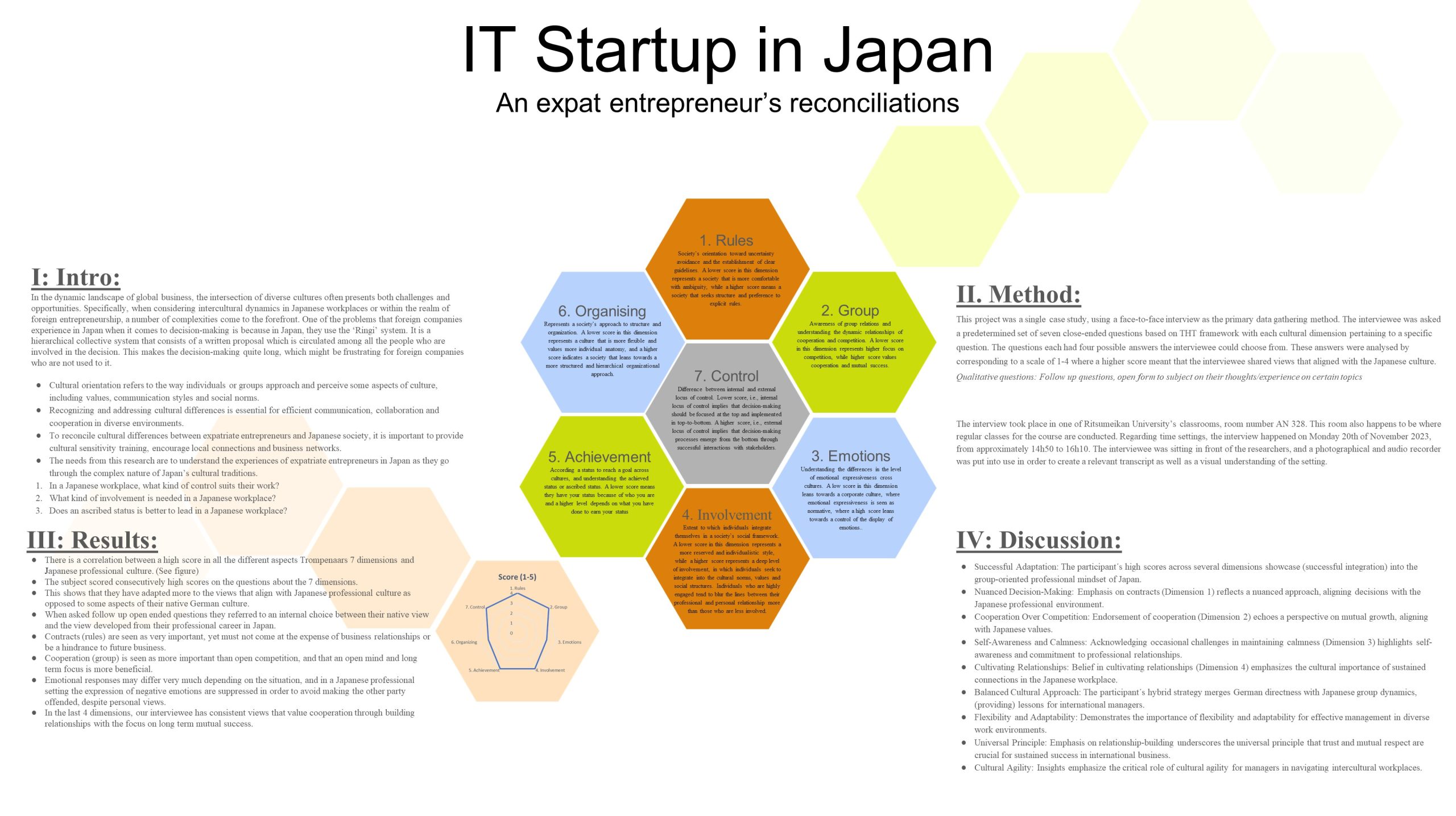
Finally, students presented their interview results on 18. DEC. 2023 at OIC public. Professor Schlunze invited former RU students and Prof Fons Trompenaars (Free Univ. of Amsterdam / THT Consulting) commented the e-poster presented joining the workshop by ZOOM. One e-poster was entitled IT startup in Japan – An expat entrepreneur’s reconciliations, and another Navigating Trompenaars’ Cultural Dimensions – Perspective of a German Expat. Also, the founder of the Transcultural Society (TNS) in Japan Professor Emiko Magoshi joint and recognized the academic effort made to state about acculturation and business success in Japan.
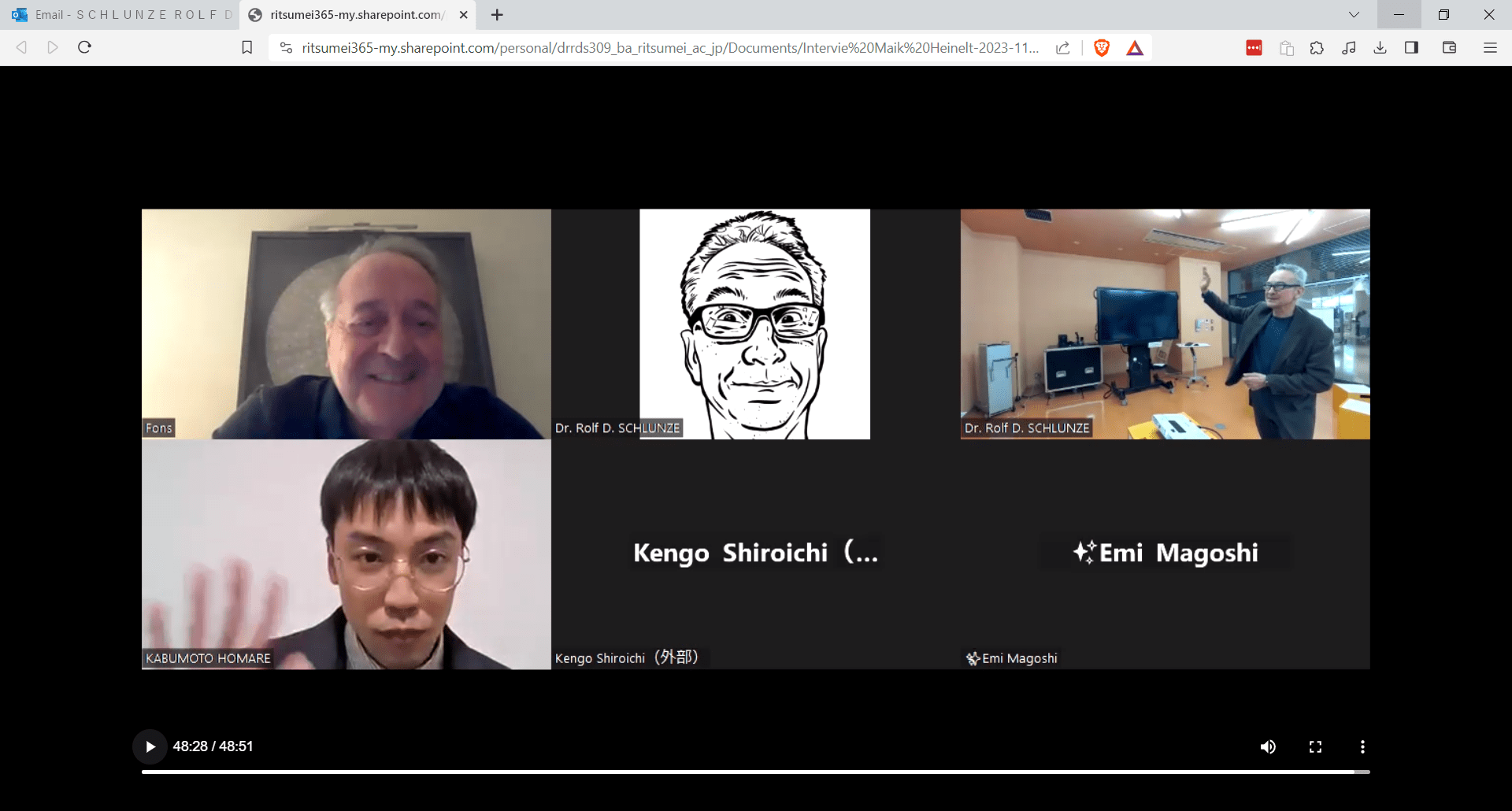
Professor Fons Trompenaars joining by ZOOM from Spain commented the e-posters
International with domestic students presented their interview results on 18. DEC. 2023 at OIC
2022
GBL students interviewing a manager about his experiences in managing a diverse team at a Japan-based subsidiary of multinational company
GBL students interviewing a manager about his experiences in managing a diverse team at a Japan-based subsidiary of multinational company. Ten students joining the GBL course were divided into three groups focusing on the macro, meso and micro aspects of intercultural management. Each group formulated research and interview questions. Thus, they were prepared to identify the circumstances, the steps of adaptation and way of thinking of a manager in the intercultural workplace. According to the students the answers of the manager to their questions given in a Zoom interview on 24th June 2022 were very conclusive. Thus, students were able to understand that it is important to adapt to Japanese culture. They learnt from the manager how to create a climate of trust and well-being within a Japan-based multicultural team. They understood that it is an important managerial challenge taking into account the cultural differences of each team member and to adapt their way of thinking to manage the diversity team efficiently. During the interview, students noticed that there are similarities between the Japanese and German cultures, such as attention to detail, the establishment of rules that promote workplace harmony, and the importance of meeting deadlines. Further, they observed differences in perception of friendship, organizational and hierarchical structures. Nevertheless, they found that it is essential to respect each other’s culture in a multicultural context. They learnt that a visionary thinking can promote problem-solving and conflict resolution in the intercultural workplace. They observed that the manager has the role of creating a suitable working environment and is in charge of spurring the performance of the multicultural team. They found that it is up to the knowledge and skills of the manager to understand how to organize the work of team members efficiently. They perceived the manager as the driving force of synergy creation. During the project research Indonesian, French and Japanese students participating learned how to successfully coordinate their multicultural team by being patience and listening to each other. Finally, they presented their interview and research results during an E-poster session receiving feedback from an informed audience that consisted of RU graduate students and a professional manager joining by Zoom from Germany.
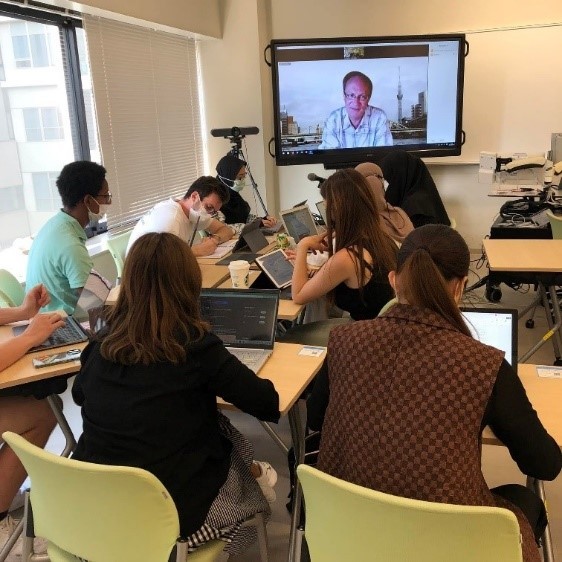 |
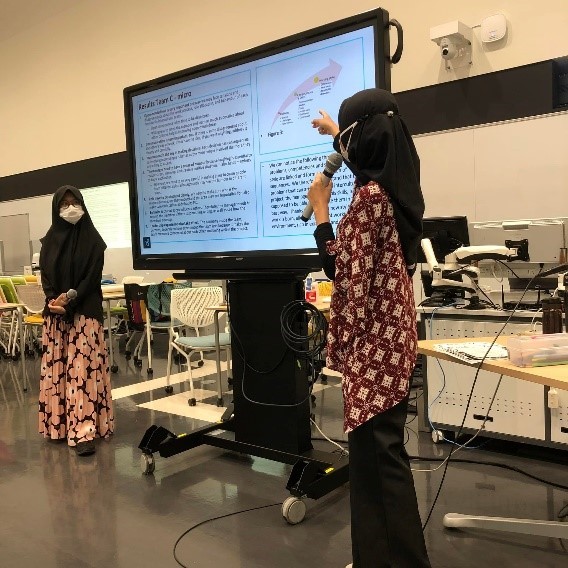 |
| International students interviewing a German manager by ZOOM | Indonesian students presenting their results during a final e-poster session |
Workshop results – Brainstorming session 19 June 2022
Li Mengyi (Carol) introduced herself as a former APU student studying at Ritsumeikan BKC for one academic year. She explained about her decision to study German and emigrate to Germany as a self-initiated expatriate and her ambition to become a global talent in the corporate world. Graduate students trained to conduct a contextual management appraisal investigated about a) acculturation, b) preference and c) networking of the female manager. The preliminary results come from a brainstorming meeting conducted after the interview.
- Acculturation: Although it is not easy to make friendship with local people, she perceives more potential to integrate into the society and intercultural workplace in Germany than in Japan. Suggesting her opinion and providing solutions at her recent workplace, an American-Chinese company based in Stuttgart, she functions as a changing agent. In Germany she applies her international experiences taking further challenges to promote her global talent.
- Preferences: Carol is focused on her own goals and / or individual career developments enjoying that she can take responsibilities and able to accept or refuse projects, accept and disagree to the organizational decision making.
- Networking: She has advisors in professional and private life to help her to localize but also friends who inspire her for globalizing practices. She works as an assistant to the managing director and receives promotion and training that improve her qualifications and skills. Trust in long-term relationship with German and other Chinese expatriates sustain her life in Germany.
Students learnt about a case of individual and organizational hybridization. The guest speaker helped international students to realize the advances in career development possible in overseas locations that open up to diversity management. Then after students were trained to transcript the interview providing evidence for the preliminary findings.
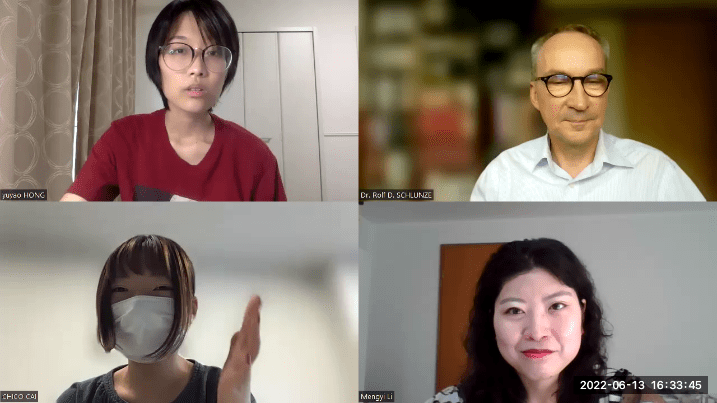
Woman manager Carol introduced herself as a former APU student
2021
Workshops conducted online with DJW Working group (AG) Intercultural Management and ManGeo Research group members at Poznan University (see research group activities)
2020
R+ students successfully interviewed the president of a German company by ZOOM
Students participating in the Special Lecture investigated the cultural adjustment, preferences and networking of a Japan-based international manager. As a research team, Fernando, Furkan, Xiang, Kang, and Weijia, prepared and conducted an interview by ZOOM successfully. The video conference was held on July 7th, 2020 with Mr. Mario Spitzer, the president of STIHL Japan K.K., who joint previously a workshop with students at OIC in June 2017. This time the students analyzed how the manager established and sustained his network of supporters. Student found that the manager adapted and managed the Japanese subsidiary successfully. Continuous improvement practices along with compliance standards implemented were to make achievements. Being patient, taking time and listening carefully to employees was found to be the “open secret” of his success. Students learnt from just one case that acculturation is a dynamic process. Respectful adaption to the local culture meanwhile increasing freedom and empowerment of operations for local employees was found to be important. They observed that cultural synergies can be generated when accurate decisions promote the corporate mission and vision. Their cultural differences helped them to assess the case from Eastern and Western perspectives. This web seminar supervised by Professor Rolf D. Schlunze will help international students to promote a synergistic culture in international organizations.
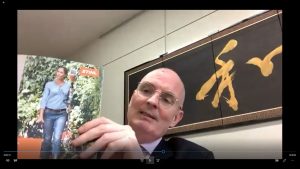
Managing director Mario Spitzer introducing STIHL Japan
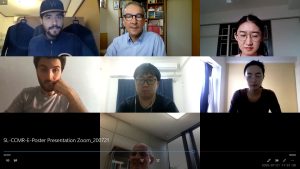
Students interviewing Mario Spitzer (STIHL Japan)
2019
Team of graduate students interviewed professional managers at OIC
Student team learnt about contextual management appraisal and interviewed a Japan-based international manager about his performance on June 4, 2019. Prof. Dr. Schlunze supervised graduated and SKP students how assess the manager’s cultural adjustment and survey preferences and network in the corporate, market and living environment. Students found that the language problems and the different mindset of Japanese colleagues provided big challenges to his acculturation and integration process. Due to the manager’s preferences in the MNE he successfully appealed with a global mindset encouraging a R&D manager to interact pro-actively on an international platform. Students identified the key supporters for implementing diversity management that aims on reducing ethnocentric, group thinking making possible necessary advances in a globalizing world. Results have been presented as an E-Poster and also as group reports enabling students to investigate more about the diversity & integration strategy of an Osaka-based multinational company.
 |
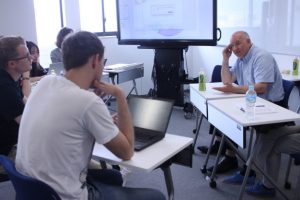 |
| Graduate and SKP students interviewing | Student Max interviewing the German manager about his cultural adjustment |
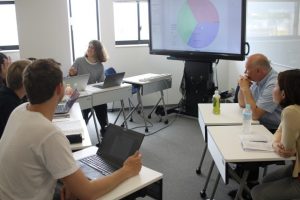 |
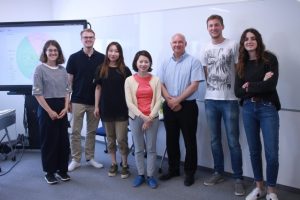 |
| Student Elena visualizing the manager’s network | Building partnerships for a professional life after the interview |
2018
Cross-cultural management research – Interactive learning beyond borders
Learning beyond borders with eleven different nationals has been an impressive experience to participants of the Cross-cultural Management Research course conducted by Professor Dr. Rolf D. Schlunze. The knowledge discussed enabled international and domestic students to acquire cognitive knowledge needed to adjust to intercultural workplaces. Interactions during a workshop with a German manager and his Japanese co-workers from an Osaka-based multinational firm helped student to create new knowledge needed to succeed globally. The ability to learn beyond borders was encouraged through group presentations. Students taught each other the Trompenaars and Hampden-Turner (THT) framework. The THT frame work is not only about realizing cultural differences but also designed to reconcile cultural differences. The frame was applied during an interview with a professional manager. Students presented their results in form of an E-poster and wrote-up a research report together. Students participating in the course might have learnt how to build their “DNA” to succeed in intercultural workplaces.
 |
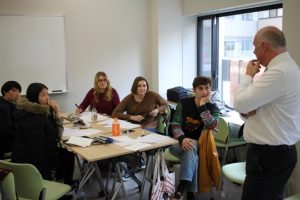 |
|
German-Japanese management team presents |
Students interviewing the German manager |
Cross-cultural management workshop: Belonging to the group
Together with international students Professor Rolf D. Schlunze’s seminar students participate in a workshop with Professor Adam Komsarof (Keio University) held on 2nd November 2018. They learnt from him that successful intercultural communication depends much on organizational and group belonging. The workshop was very interactive. Students discussed their experiences guided by the framework introduced. They learnt how to adjust to intercultural workplaces. Adam managed to fit in as a “polite foreigner” being aware of the indirect communication style in Japan. Kosei observed that he succeeded by contributing as a native-like or assimilated member even he was sometimes treated as an outsider. Mitsuki found that Adam tries to be open-minded. Lina concluded that the ability to take time and listen is important when adapting to Japanese workplaces.
| Professor Adam Komsarof explains | Be open-minded, take time and listen |
Cross-cultural Management Workshop with Gracia Liu-Farrer
On 30th November 2018 student of the Cross-cultural management seminar received a lecture about American and Chinese entrepreneurs’ cultural adjustment and networking in Japan from Professor William Baber (Kyoto University) and their supervisor Professor Rolf D. Schlunze. Professor Gracia Liu-Farrer from Waseda University was invited to present her research. She introduced her recent book project entitled Immigrant Japan: Mobility and belonging in an ethno-nationalist society and previous research on Labor migration from China to Japan. CHI Cheng (Cindy) presented her PhD project on a Chinese managers’ networking in Africa and received constructive critiques. In the third part of the workshop Gracia presented her research entitled “Changing Career Practices on the Globalizing Labor Market: the Challenges to the Corporate Japan”. Conflicts and contradictions of HR policy towards globalization in Japanese workplaces were made obvious. We discussed then how rigid images nurturing ethnocentric behavior are nowadays transforming towards concepts that promote a more integrative society making possible intercultural workplaces also in Japan.
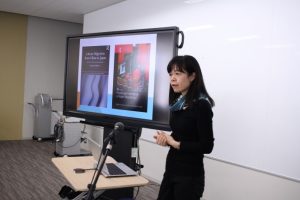 |
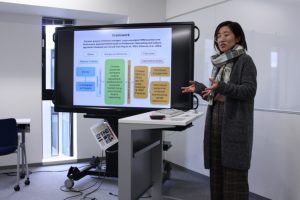 |
| Gracia Liu-Farrer introducing her book publications and recent research | CHI Cheng (Cindy) presented her case study research |
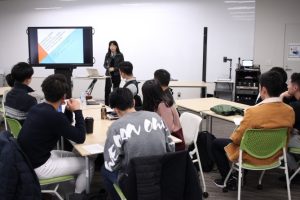 |
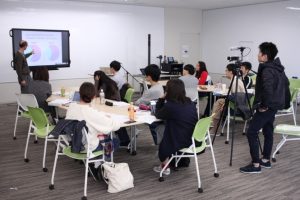 |
| Gracia discusses Changing Career Practices | Will Baber presenting American managers’ about success and failure |
2017
CCMR Workshop: Managerial adjustment and synergy creation in intercultural workplaces
On December 1, 2017 Professor Rolf D. Schlunze conducted a workshop with professional coach, Michel Lachaussée, about cultural adjustment to the Japanese workplace for domestic and international students in English. The purpose of the workshop was to understand how cultural differences can be reconciled in purpose create cultural synergy. Students interviewed a French manager about working and living experiences in Japan. What is his cultural orientation? How to coach local staff members and create supporters in the intercultural workplace? What coaching practices are useful to create cultural synergy?
This workshop is designed to speak to cutting edge ideas and methods in cross-cultural management research. Students were encouraged to think about cross-cultural management practices. Therefore, Michel Lachaussée (Executive coach at équilibre K.K. and formerly head of Merial Japan) shared his working experiences in Japan. The exchange offered a good opportunity for RU students to learn how to promote effective management in the intercultural workplace. All students were firmly positive that they learnt something concrete from our workshop and saw the interaction with the coaching as valuable. Japanese students learnt to overcome their shyness and, like Naohiro, learnt how to address questions deepening their knowledge. Florian wrote that Michel has been a great speaker providing kind and deep analyses on intercultural workplace issues. Kim found it was a great opportunity with Michel to win a better understanding about international management in general. Angela found that in case of dealing with contracts the French manager following a Western approach appears not believe in symbolized relationships. NyuYen Tien Manh observed that the manager adjusted to the collectivistic culture in Japan. Students believe that the French coach has a vision how to manage in Japan. Florian reasoned that studying about history and country characteristics is helpful to adjust culturally. Kim found that the international manager is able to combine strength of the host and home country. All students found that the manager is culturally adjusted. Keigo mentioned it is because he considers carefully cultural differences when adjusting to Japanese working environment. Florian observed that the strongest adjustment made was how to cope with emotions. Correspondingly Angela found that the manager has a very Japanese approach when interact sensing co-workers and subordinates’ emotions. Kanako argued that his Japanese family might be a key tool of his successful cultural learning. The communication within this workshop has been motivating students to deepen their knowledge of intercultural management issues.
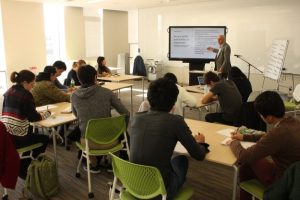 |
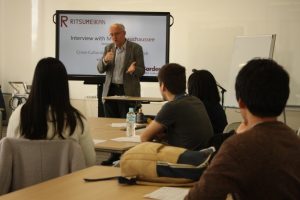 |
|
Michel Lachaussée interviewed by R+students |
Michel explains about his cultural orientation concerning profitability and stakeholder relations |
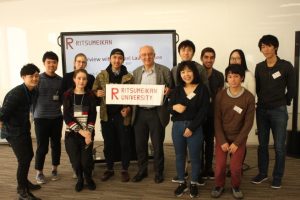 |
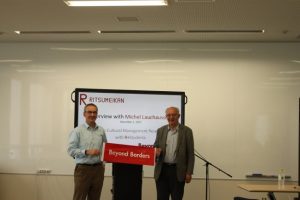 |
|
Students prepared joining this workshop during ten continues lectures |
We trained students to communicate adjustment strategies to the intercultural workplace |
2017 GBL Research Project Intercultural workplace
Workshop with P&G managers
With Mr. Fang and Ms. Matsuno from Procter & Gamble KK we conducted a workshop on 29th November 2017. All students reported that they learned something concrete and gave a firmly positive assessment for this workshop. Logan, an international student from the USA, commented that students received an awesome presentation by the managers. The communication in this workshop has been motivating to him and the other students. Under the supervision of Professor Dr. Rolf D. Schlunze the students build a model to evaluate diversity in the intercultural workplace and prepared questions accordingly. Students evaluated the speech of the P&G managers and found that they apply a vision about managing diversity in the intercultural workplace. Managers discussed diversity and inclusion as an important idea for work-life balance. The management system and style at P&G became clear to our students. Student found that diversity management at P&G is an important Human Resource Management (HRM) tool.
Mr. Fang strongly supports diversity. P&G is far above the average employing female staff. The company enables work-life balance by flexible working hours and telecommunication from home offices. Personality management and diversity inclusion was perceived as an important practice. Diversity is implemented as a business strategy at P&G respecting individual differences of all employees. Knowing and acknowledging personality differences is the best way to build cross-cultural teams. The P&G employees need to decide their working goals and will be assessed by the fulfillment of these goals since everything is decided by the employees’ performance, not your gender, nationality and practice. Our student learnt from the Mr. Fang and Ms. Matsuno that diversity and inclusion can be perceived as strategy making a company more competitive.
Workshop with SYSMEX manager
We conducted a workshop with Mr. Obe from Sysmex Corporation 6th December 2017. All students were eager to learn from the manager about the intercultural workplace. Mr. Obe said he does not have “vision”. Nevertheless, students found that has a strategy to implement diversity management. His purpose is to improve the company’s Human Resource (HR) quality. Students noticed that Mr. Obe is actually focusing on performance and outcome, and not so much on cultural differences. His vision can be explained by the corporate philosophy and history of the company. He does not judge people on their culture but more on their personal experience and background. He sees the sociability of employees within the corporation as an important challenge of new employees’ challenge. An important practice to deal efficiently with diversity is to implement international business standards. Providing a kids room for employees’ children is one important step. On the other hand, he believes that highlighting local advantages is actually more effective when adapting to different markets.
Students learnt from both company cases that successful HRM depends more on knowing the people than on a policy. Nevertheless they realized that human resource management should be guided by a IHRM policy that aims for diversity and inclusion in the intercultural workplace.
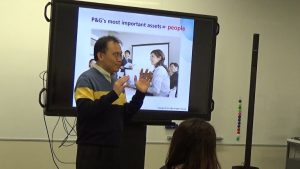 |
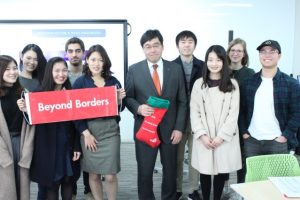 |
|
Mr. Fang presents about diversity at P&G Japan |
Mr. Obe discussed about IHRM with R+ students |
2016
16th Workshop – Intercultural Management Workshop at the DJW Symposium
The SIEM workshop held at the 30 anniversary meeting of DJW on June 18th, 2016 was divided in presentation, role play and wrap-up. Dr. Rolf Schlunze gave a short presentation and conducted role plays with the audience splitting up into small groups. Ms. Yuki Itakura from moderated the wrap-up. Rolf presented cultural dynamics and insides from a co-leadership case introducing the five situations that business people can face during intercultural negotiation processes: cultural avoidance, cultural dominance, cultural accommodation, cultural compromising and finally cultural synergy. Explaining about a co-leadership case he showed important characteristics of two co-workers and the development of their mindset in order to produce intercultural synergy. He showed that even managers with divergent preferences and learning styles can adjust to each other by reconciling cultural differences. Creating new values by managers with creditability and synergetic power can function as a multiplication effect within and between organizations. In Rolf’s role play participants learnt how to negotiate in an intercultural setting. Techniques like not judging, being open to listening, showing respect when communicating a problem were practiced and various controversies were discussed later. Wrap-up: During the wrap up the participants presented their workshop experiences. Rolf’s group explained that they had been too fast in compromising and that in reality more resistance in the form of attempts of cultural dominance can be expected. It was clear that cultural synergy is an outcome of dynamic processes that includes loops of learning on both sides, when Ms. Yuki Itakura mentioned that German clients often ask why Japanese business people do not express what they want while Japanese business people often wonder why Germans cannot anticipate what they want. In conclusion, we found that German business partners need to learn to read the atmosphere 「空気を読む」and develop this skill to a degree that it might become a success key doing business with Japanese people. Therefore, together we are calling for the formation of a workgroup on intercultural management sharing our experiences and practices in order to create cultural synergy in the particular intercultural workplaces.
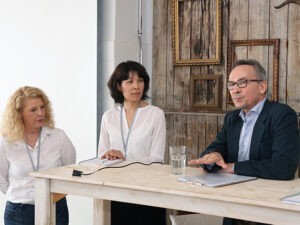 Workshop in Berlin am 18.6.2016 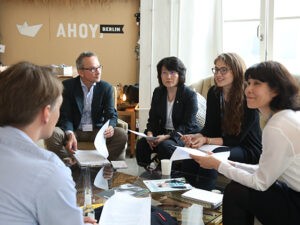 DJW AG Intercultural Management |
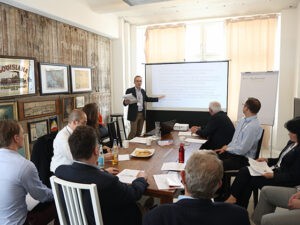 |
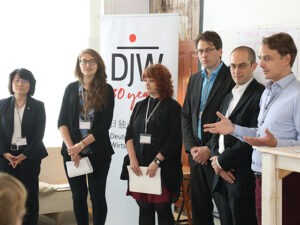 |
“Freundschaft ist wie eine alte Tür, durch die man den Anderen erreicht: Gelegentlich knarrt sie, gelegentlich klemmt sie auch, aber sie ist niemals verschlossen!”
Citation (6.15 min.) of Japanese-German Business Association (DJW) founder Ruprecht Vondran at the 30 Years Anniversary DJW Symposium with the topic “Startup Cooperations” / DJW日独産業協会30周年
With permission ©DJW; Fotos: Stefan Wallocha
2015
15th Workshop – Discussing Intercultural Workplaces and Diversity Management in Japan
Professor Dr. Rolf Schlunze led a GBL research project conducting interviews with managing directors at workshops and during company visits. The aim of the GBL Research Project was to learn how to recognize and reconcile cultural differences in the workplace, and to investigate preferences and networking of international managers. On 17th June the president Mr. Reisei Kawahara from Suncolor Shipping Co.,Ltd (SCS) was invited as a guest speaker. GBL Project Research students interviewed him about his experiences in the intercultural workplace. On 24th June Mr. Rick Cogley, the CEO of eSolia Inc., was interviewed about how he adjusts and manages cultural differences. On 27th June, Mr. Xiubang Zhang, the president of NEUSOFT Japan talk about his diversity in the Chinese-Japanese workplace. Graduate students used onscreen software to analyze the manager’s preferences and mapped his network. GBL Project Research students visited the intercultural workplaces of Rediscover Japan K.K. and IKEA Kobe interviewing the managing director.
All students involved in the workshops presented their results on 11th July 2015 in an E-Poster session. Results about the intercultural workplace of SCS, Rediscover Japan, P&G, IKEA and NEUSOFT Japan were presented. After watching the film HaFu students discussed about diversity in the living and workplace. Students found that leaders and co-workers need to be educated about diversity issues. Mr. Edward Sumoto gave an adaptation of his TEDxKobe talk and pointed out that there is need to teach more about diversity management at Japanese universities. However, R+ students found that diversity manuals are not sufficient to ensure fair treatment in intercultural workplaces but found that our society needs to learn to become more integrative to increasing population of diverse people.
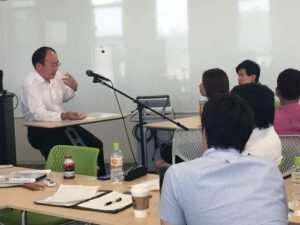 Interview with Mr. Kawahara (SCS) |
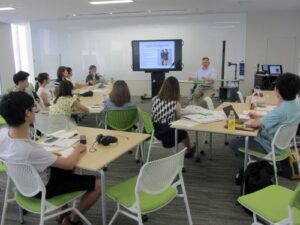 Interview with Mr. Rick Cogley (eSolia) |
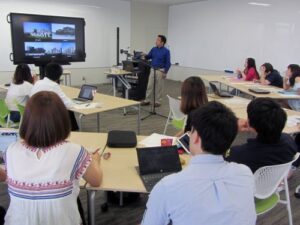 Interview with Mr. Zhang (NEUSOFT) |
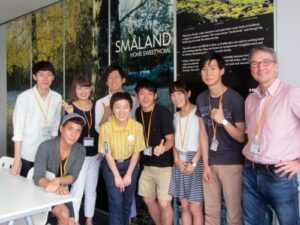 Interview with Cristal Huang at IKEA Kobe |
2014
14th SIEM Workshop: Student learnt to discover talents in international management
A leadership talent workshop was organized by Profs. Rolf Schlunze and Will Baber on 29th November 2014. The purpose of this workshop was to understand the basic principles of leadership and how it can be developed.
International and domestic students were encouraged by Michel Lachaussee, a professional coaching expert, and previously the head of Merial Japan, to discover their talents in order to build intercultural competence. Mr. Guoxiang Wu, the president of China Southern Airlines introduced his personal experiences in Japan and gave a good example of his talent for adjusting the business approach of his globalizing company to the Japanese market environment. Students from Denmark, France, Mexico, China and Japan spoke with the invited professionals about cutting edge ideas in talent management. Marianna from Mexico realized that international managers need to perform cultural intelligence in purpose to lead their subordinates. Pernille from Denmark experienced that the contextual management appraisal designed by SIEM is a useful tool for evaluating managers’ talents and performance. Sharing information was seen by Kevin from France and Hisashi from Japan as a useful method to discover talents and promoting mutual understanding in the intercultural workplace. Yumi, a student of the cross-cultural management seminar, concluded that especially Japanese need to learn to be speak with confidence about their own and their co-workers’ talents.
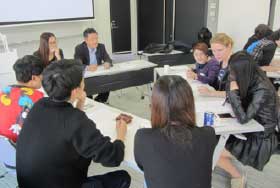 Mr. Wu shares his talent with students |
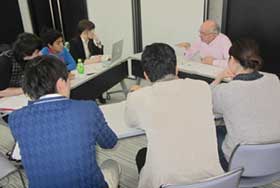 Mr. Lachaussee explains about coaching practices |
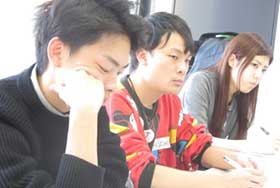 Cross-cultural management seminar students interviewing professionals |
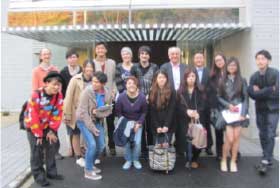 Participants of the talent workshop in front of the BKC International House |
13th SIEM workshop discussing Guanxi of Chinese entrepreneurs in Japan
Prof. Dr. Rolf D. Schlunze & Prof. Masaki Mori (Ritsumeikan University) conducted a workshop about the networking practices of successful Chinese entrepreneurs in Japan on June 7, 2014. Chinese managers equipped with Guanxi are powerful networkers. However, to be successful in Japan the managers need to adjust to the cultural business environment and pro-actively bridge cultural differences within their business network. The Chinese entrepreneurs described their business activities and intercultural networking. Students eagerly assessed the Chinese managers’ cultural orientation, preferences and networking in the corporate, market, living environment in order to see how they develop their networking strategies. The workshop has three structural elements: Mr. Chang Yulan (President of C&S) spoke about certifying standards for products of transnational corporations; and Ms. Anna Cao (President of Nikka) taught the students important aspects of the globalizing IT companies.
All students found that the interaction of professionals was valuable. Professors filed up material including questionnaires for the interview that needed to be conducted with the two managers after their presentations. Students stated that the information in this workshop has been motivating to them and that they learned something concrete from participating in this workshop. After the workshop all students agree that sharing network information is needed to succeed in global and local markets. Rike found that Guanxi is most important key to success in business all over the world. Ms. Anna Cao answered that Guanxi relates to the business. Naoto concluded that there is no success without sharing networks. Ryo found that a big element to succeed in business is people. Therefore, networking is one of the most important skills an entrepreneur should have. Daniel from Germany found that we are in a global world and that we can only work successfully together, if we share information. Aom from Thailand went further and suggested that the more connections you have, the more your business will be successful. The original SIEM management appraisal was introduced and students found it was effective to interview about acculturation. Students observed that by assessing cultural differences, such an appraisal can sustain strategic power of company in the adjustment process. The students believe that nowadays entrepreneurs need to have the ability to collaborate with each other when creating new businesses globally. Nowadays, many companies feel the limit of what they can do by themselves found Rike and concluded that collaboration of different industries is good for the business in the future. Daniel pointed out that in a globalizing world more skills, e.g. communication skills, are needed. Our guest speakers also mentioned that without collaboration within their network it would be difficult to survive.
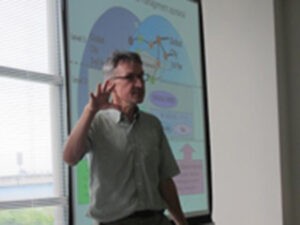 Prof. Dr. Schlunze explains the management appraisal Prof. Dr. Schlunze explains the management appraisal |
|
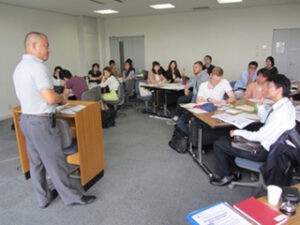 Mr. Yulan Chang explains about his experiences embedding his business in Japan |
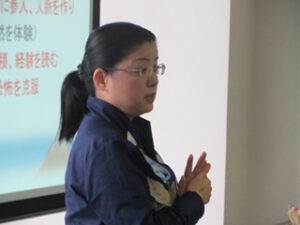 Ms. Anna Cao talks about necessary adjustments of IT people that wish to go global |
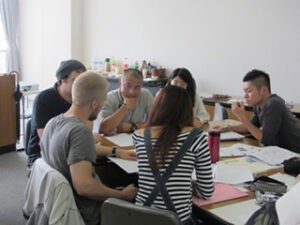 Students interview Chinese entrepreneurs |
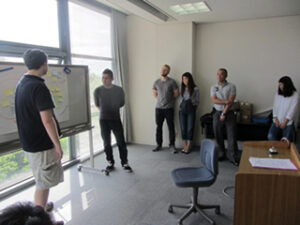 Students wrap up their results by poster |
2013
12th SIEM Workshop introducing the Disney Imagineering Strategy to Business Students
Together with the managing director of Merial Japan, Mr. Michel Lachaussée, students learnt about a unique approach promoting success in business. Twenty students with a good command in English participated under the supervision of Professor Rolf D. Schlunze in the workshop held at BKC on Saturday 26th October 2013.
First, the case of the French company Merial Japan K.K. was introduced by means of a professionally made DVD. Mr. Lachaussée commented on the case study and additionally, presented his experiences in the intercultural workplace. Second, Prof. Will Baber (Kyoto Univ.) conducted an interactive instruction introducing Disney Imagineering Strategy (DIS) for development of large projects. This method was used at Merial Japan to improve the motivation of their culturally diverse staff members.
Finally, all students came to believe that DIS is a powerful method to achieve success in the intercultural workplace. A student from Hong Kong, Mr. Wang, noticed that DIS is a simple and well-organized process for improving the success of managerial processes. Klevia from Sweden mentioned that DIS aids people to interact more. Katsuya, a Japanese student, found that people have to start by considering their dreams and then learn to share it with others. Another student from Sweden, Jacqueline, concluded that coaching can contribute to a better understanding among people and has therefore a positive effect on work relations. A student from Mexico, Diego, suggested that managing people requires a lot of techniques. Passing them to the younger generation is seen as a valuable task of managers and scholars belonging to SIEM.
SIEM is grateful for the sponsorship of Society for the promotion of Japanese Classical Writings and for Educational Exchange. All students mentioned that they would like to participate in SIEM workshops again.
11th SIEM Workshop: How Bryan Norton educates local employees at T-MARK in communication skills
A SIEM workshop was held at Ritsumeikan BKC on 19th June 2013 about Diversity Management in Japan with Bryan Norton (CEO of T-MARK). During the workshop students of international business administration learned about Bryan’s unique approach. He convinced the audience that teamwork with members from diverse cultures is possible in Japan. Many questions about diversity management were addressed and Bryan enthused his audience to make efforts to communicate with people from other countries efficiently.
Bryan introduces four key skills to his employees to enable them to work on a global scale. These skills include comprehension, anticipation, awareness, and engagement. He indicated that knowing one another’s thinking is critical in order to solve problems inside a team. Bryan believes that many Japanese employees are not willing to do the job if they do not understand the meaning properly. Thus, he is patient to explain several times to his employees until they really understand what they need to do. If his staff does not ask any question he asks. Further, he assists them in problem solving. A key problem among his staff is that they cannot discuss work issues easily with each other. Lack of discussion is in turn an obstacle to decision making. However, Bryan, acting as a good leader, supports his staff and believes that correct decisions do not have to be made every time. Instead, he believes that his local staff must learn to make decisions and to take responsibility for their decisions. Thus, he believes it is important to listen to others, and to respect other peoples’ ideas even when risk of failure is involved.
Obviously, Bryan can be perceived as a good leader enabling his employees to take challenges and to have personal satisfaction for their achievements. His honest and straightforward statements encouraged workshop participants to join a multi-cultural workforce. By sharing his experiences and unique approach he created a valuable opportunity to prepare for a better and multi-cultural workplace future in Japan.
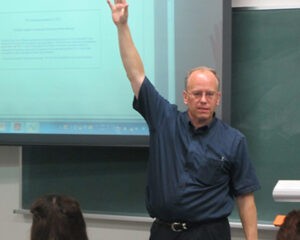
Bryan Norton, CEO of T-MARK, encourages his Japanese audience to speak up!
2012
10th workshop – SIEM Workshop on Corporate Governance
Professors Rolf D. Schlunze and William Baber (Kyoto Univesity) conducted a workshop on Corporate Governance on Saturday, December 1st 2012 with 31 participants. The Co-auditors of BNP Paribas Securities Japan Limited, Mr. Charles Vacher and Takashi Kasagami, discussed Corporate Governance in International Groups with students and other professional participants. Ms. Tomoko Ohmae, President and CEO of PRARD Corporation, spoke about her career as a successful woman international manager in Japan. All participants got a firmly positive message that the interaction of students and professionals was valuable and that everyone learned something concrete from participating in this workshop.
After the workshop the students indicated that corporate governance is needed to survive in the global and local market. They felt the need for outside auditors and that it is more preferable for management to govern their corporate organizations properly with accountability than to be regulated by government, domestic or international organizations. Most students believe now that transparency and information sharing in the intercultural workplace is a powerful method to achieve corporate success because corporate government gives many perspectives not only for the board but for the entire organization improving teamwork and spirit. The students came to understand that nowadays international managers can successfully span boundaries when they have a clear vision of corporate governance. They now grasp the need to learn about global standards and prepare for change in the Japanese corporate governance landscape!
Professor Adam Acar from Kobe City University of Foreign studies shared some feedback at the end mentioning the importance of culture when it comes to corporate governance. He stated that information sharing, transparency, the decision-making process and the relationship between shareholders and stake holders are very likely to be influenced by cultural dimensions like power distance and local communication styles. In the brainstorming session after the workshop students came up with interesting ideas. They discussed Corporate Governance as a practice not well known among the “family-like” companies since those companies prefer internal rather than external control.
Students described those companies as sleeping elephants not yet willing to connect to the global community. They concluded that initial culture shock by Japanese employees of foreign companies could be also described as the learning about other firms that are more globally connected and innovative. Further, the students realized the value of cultural learning and corporate governance that seeks to achieve global competence and accountability. Finally, Japanese and international students from France, Sweden and Russia participating in the Cross-cultural management research course of Prof. Schlunze concluded that technology can be helpful in bringing different cultures together sharing similar values and practices concerning corporate governance. For example, IT can be applied for more transparency and a better accountability for heightening the trust of stakeholders globally in the corporation.
8th SIEM Workshop – Cross-Cultural Management Seminar with Mr. Duco Delgorge #2
A cross-cultural management seminar was held by Professor Dr. Rolf Schlunze on June 20, 2012 with Mr. Duco Delgorge. Mr. Delgorge was born in Prague but brought up and educated in many places around the globe until multinational companies brought him to Japan. Realizing the limits and shortcomings of big business, he founded his own business encouraged by the ideas of E. F. Schumacher published in his book entitled “Small Is Beautiful”. His company is called the MIE Project; M stands for Meaning, I for Inspiration and E for Effectiveness. Compared with other countries, the size of organic packaged food market is very small in Japan but the health concerns of Japanese consumers are creating increasing acceptance for organic food products. Indicating the growing danger of global social, economic and ecological crises ahead, he encouraged students to think about better models than the existing and dominating one. Instead of copying and prolonging old obsolete models they should try to reach the critical mass to move to a better system.
One of our diligent students fluent in English, Yoshimasu, commented that Mr. Duco Delgorge is a great guest speaker and that he was encouraged to change the way of doing business as well. After the workshop most students believed that social business is a great option to better this world and needs to be studied by business students more. To explain about social business, Mr. Delgorge introduced the example of Professor Muhammad Yunus, who was the first to establish a bank as a social business, lending money to poor people enabling them to start their own businesses and sustain their life. Mr. Delgorge got his first job in Brighton, U.K. where Anita Roddick founded the first Body Shop. The students’ attention was brought to other social businesses such as Mondragon, a cooperative with 70,000 employees once started in Spain, Cliff, Patagonia, Balle and SlowMoney.
The students became aware of concerns about the future. Referring to the book The 7 Habits of Highly Effective People by Steven Covey, the speaker encouraged our students to keep a positive attitude, work to find solutions of global problems and widen their circle of influence in the process. He told a German exchange student to try to be part of the solution and not the problem. A female second year student, Eri, learned that thinking about other people and helping each other is the essence of social business. Mr. Delgorge spoke critically about food and other global crises indicating problems like greed in the way we do business. However, he explained to the students when pointing with one finger at others, three fingers point back at ourselves. One student, Suzuka, was impressed to learn that we actually need to change ourselves first in order to better this world. An international student from Hong Kong, Lawrence, learned about the “Occupy Wall Street” movement in New York and found that we need to stabilize our international business relations and wished to learn more about social businesses. Another student, Eriko, felt that sustainability needs to be promoted by Europe and Japan.
A second year student, Hiroki, found that the content of the lecture was very new and inspiring. Some students, such as Emiko, showed their appreciation of the organic food business and hoped that it will spread over the world. Delgorge animated the students to read books about new concepts and ways of doing business that help to better the world, including Riku. Clearly, the students realized that we need to think about the next generation and promote social business as Ryo pointed out. The power of thinking about fair trade as an engine to change the world was discovered by other students during the lecture, Akiko and Shieri. Another fourth year student, Kyoko, noted that in ordinary business classes, social business rarely becomes a topic. This tells us that it is time that we, the university professors, also think about changing. Students like Takashi were glad to join the workshop and stated their appreciation to Professor Schlunze who has been holding workshops with international business leaders since November 2008 at the Biwako Kusatsu Campus.
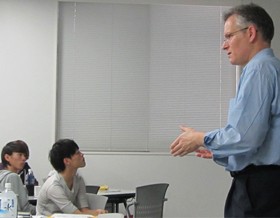 |
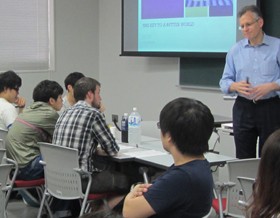 |
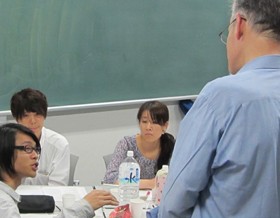 |
9th SIEM Workshop – Cross-Cultural Management Seminar with Mr. Duco Delgorge
Prof. Dr. Rolf D. Schlunze
June 20, 2012
Mr. Duco Delgorge was born in Praha but brought up and educated in many diverse places around the globe until multinational companies send him to Japan. Realizing the limits and shortcomings of big business he founded his own business encouraged by the thoughts of E. F. Schumacher published in his book entitled “Small is beautiful”. His company is called MIE Project; M stays for Meaning, I for Inspiration and E for Effectiveness. Compared with other countries the share of organic packed food market is very small in Japan but the health concern of Japanese consumers gives increasing acceptance for organic food products. Indicating the growing danger of global social, economic and ecological crisis ahead he encouraged students to think about better models than the existing and dominating one. Instead of copying and prolonging old obsolete models they should try to reach the critical mass to move to a better system. One of our diligent students fluent in English (Yoshimasu) commented that Mr. Duco Delgorge is a great guest speaker and was encouraged to change the way of doing business as well. After the workshop most students believed that social business is great option to better this world and needs to be studies by business students more. To explain about social business Mr. Delgorge introduced the example of Professor Muhammad Yunus who was the first to establish a bank as social business lending money to poor people enabling them to start their own business and sustain their life. Mr. Delgorge got his first job in Brighten (UK) where Anita Roddick founded the first Body Shop. The students’ attention was brought to other social businesses such as Mondragon a cooperative with 70,000 employees once started in Spain, Cliff, Patagonia, Balle and SlowMoney.
The students came to be concerned about the future. Referring to the book The 7 Habits of Highly Effective People by Steven Covey the speaker encouraged our students to keep a positive attitude, work about solutions of global problems and widening their circle of influence in the process. He told a German exchange student to try to be part of the solutions and not of the problem. A female second year student, Eri, learned that thinking about other people and helping each other is the essence of social business.
Mr. Delgorge spoke critical about food and other global crises indicating problems like greed in the way we do business. However, he explained to the students when pointing with one finger at others, three fingers point on ourselves. One student, Suzuka, was impressed to learn that we actually need to change ourselves first in purpose to better this world. An international student from Hong Kong, Lawrence, learned about the “Occupy Wall Street” movement in New York and found that we need to stabilize our international business relations and wish to learn more about social businesses. Another student, Eriko, felt that sustainability needs to be promoted by Europe and Japan.
A second year student, Hiroki, found that the content of the lecture was very new and inspiring. Some students, such as Emiko, showed their appreciation of the organic food business and hoped that it will spread over the world. Delgorge animated the students to read books about new concepts and ways of doing business that help to better the world including Riku. Clearly, the students realized that we need to think about the next generation and promote social business as Ryo pointed out. The power of thinking about fair trade as an engine to change the world was discovered by other students during the lecture, Akiko and Shieri. Another fourth year student, Kyoko, noted that in ordinary business classes, social business rarely becomes a topic. This tells us that it is time that we, the university professors, also think about changing. Students like Takashi were glad to join the workshop and showed their gratefulness to Professor Schlunze who has been holding workshops with international business leaders since 2009 at BKC.
7th SIEM Workshop on Co-Leadership at BKC, November 2012
Professor Dr. Rolf D. Schlunze (Ritsumeikan University) and Professor Will Baber (Kyoto University) conducted a workshop on co-leadership for 50 Japanese and international students on November 18th. The workshop was joined by the two co-CEOs of BNP-Partitas Security Tokyo, Mr. Charles Vacher and Mr. Takashi Kasagami. Before the workshop Dr. Schlunze surveyed their case of successful partnership and synergy creation in the intercultural workplace. In preparation for the workshop, students learned about cultural adjustment, preferences and networking in the corporate, market and living environment. During the workshop students had opportunities to directly interact with the co-CEOs.
Feedback regarding the workshop entirely was positive. All students stated that they learnt something concrete from the workshop, that the interaction with the professionals and with their co-students was valuable. Additionally, all students indicated that information in the workshop was motivating for them and that they wish to participate again. Some students of course cannot participate again because they are returning to their home countries or graduating soon. We hope to invite them one day as professionals! In this way SIEM seeks to establish a long term sustainable network for research and practical discussion. We will inform graduates about the workshop and other SIEM meetings by e-mail and through www.siemrg.org.
Feedback from students regarding the event was overwhelmingly positive. (See Table 1.)
We asked the students “After the workshop, do you believe that the adjustment and/or partnership provide a solution to overcome cultural differences?” Twenty eight answered with Yes and 4 with No. Specific comments follow.
- A seminar student of Professor Schlunze explained that it is usual for us to be confronted with cultural differences but it is also possible to find ways to overcome them.
- Tang Baifu stated that the introduced guest speakers provided an exactly perfect example for mutual adjustment and a good partnership in the intercultural workplace succeeding to develop trust between each other.
- Valentina Dogo saw this case as revolutionary concerning mutual empowerment through transparency and network sharing.
- Andrew Marace noticed that partnership provides a solution to overcome this issue because each partner can provide valuable insights into each other culture.
- Meeting somebody with a different cultural background means to compromise and adjust to the other, new culture, as commented by Aya Terauchi.
- Ryo Hagiwara wrote that even though people have different backgrounds if they respect each other and contribute towards the same goal they can overcome differences.
- Nozomi Furukawa discovered that the co-leaders help each other and therefore are able to overcome cultural differences.
- Riku Narita found that in the globalization process partnership is absolutely needed to achieve intercultural synergy between different nations.
- Haruka Ikeda found that it is important to overcome differences and to have good and respectful relations.
- Andreas Naujohs stated that it is impossible to create mutual benefits when ignoring each other’s culture.
- Petra van Ouderallen found that first a professional attitude, and second maintaining one’s own culture is important.
- Nobuyuki Yukawa concluded that problems arisen from cultural difference can be solved when partnership develops.
- Different cultural backgrounds actually are helpful to overcome intercultural issues found Florent Tasselli from France who had international experiences including an internship in Germany.
We also asked if the students believe that preferences in the corporate, market and living environment need to be complementary to work successfully together? 29 students agreed that sharing similar preferences is helpful for the business success but five students disagreed. Specific comments follow.
- One reason not to agree was that disagreement creates a big opportunity to come up with new solutions, as mentioned by Henning Hildebrandt.
- Valentina Dogo reasoned that it depends on the preferences, if you can adjust to intercultural workplace or not. It is important to be open and to commit with new situations than to share the same preferences.
- Aya Terauchi believes that it would be more successful when we apply the old rule
- Nobuyuki Yukawa however concluded that the people can learn from each other’s differences instead of adjusting on the surface.
Thirty six students agreed that transparency and information sharing in the common network is a powerful method to achieve co-leadership success. Only one student disagreed.
- Andrew found also that transparency creates better understanding and trust which promotes more success.
- Valentina saw that transparency, common network, sharing information, solving the problem, getting to know someone important that lead you to success, were valuable.
- Henning noted that without transparency you will never have a common network.
- Aya expected that getting to know to someone important may lead to personal success.
- Haruki Kaneda stated that hiding something always creates further problems.
- Shinji Sawa found that the co-leadership model creates strong connections with other people.
- Nozomi reported that the French businessman mentioned that he perceived their shared network as a property.
As the pictures show the guest speakers, the international students and domestic students did enjoy the experimental and academic experience of the workshop very much. Especially the social network activity of Professor Baber received good feedback by our students. Professor Schlunze further discussed dynamics synergy creation together with the students preparing for a speech contest. They learnt from the of co-leadership case that compromising is an important phase in the process of reaching synergy through a lengthy process in the intercultural workplace.
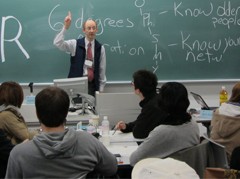
Prof. William Baber |
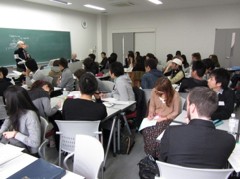
Mr. Kasagami presents to RU students |
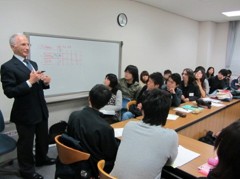
Mr. Vacher explains to students |
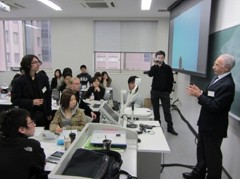
French student, Thibaut Fantian, discusses with co-CEO Vacher |
IHRM Workshop for international and R+ students
A workshop organized by Professor Rolf D. Schlunze and Professor William Baber (Kyoto University) was welcomed by international students as a unique learning experience.
Based on an article in the Ritsumeikan Business Journal entitled “Working towards Hybrid Solutions: The Possibility of an IHRM model in Japan” they sought to help professional managers implementing the hybrid model to improve international human resource management in Japan.
The first guest speaker the president of Höganäs Japan, Carl Eklund, delivered a speech to the students about his work in Japan as a corporate leader. He emphasized that it is important for an international manager in Japan to function as a link between one’s home country and the host country. The key issue is that intercultural management needs to be balanced by cultural competence since the form is sometimes more important than the substance in Japan. He told us that he sees limitations for building hybrid organizations in Japan. The selection of suitable staff is most important since not stars but equal and skillful team members build towards a good cross-cultural work.
The second guest speaker, Karola Japke from Teijin Group, told us that the engagement of employees is an important aspect of cross-cultural management. Thus, Teijin Group promotes diversity and inclusion as an added value and a premise for success ensuring that all employees move into the same direction. To make this achievement open and trustworthy, communication needs to be established in the global network of the multinational company. Therefore, Teijin sources talented people worldwide regardless of their cultural background, gender or age providing cross-cultural understanding and leadership competencies.
The final guest speakers, Charles Vacher and Takashi Kasagami, who work as co-CEOs at BNP Paribas Securities Japan, gave a critical analysis of global trade, global finance, international human resources issues, global marketing strategies and also failure stories of Japanese and foreign companies in Japan. They found that hybrid organizations are needed to overcome national regulation and protectionist tendencies enabling cross-border integration.
Students told us that they enjoyed the occasion to have an exchange with professional managers. The students stated that they learned something concrete from participating in this workshop. The students learned that trust and respect are most important for cross-cultural management. They realized that it is also important to communicate a global vision among equals and to build communication strategies that enable integration of co-workers with diverse cultural backgrounds.
We asked the students if after the workshop they believe that the hybrid strategy provides a solution to international human resource management problems. About two-thirds, 21 out of 30, answered yes. Karola Japke (Teijin Ltd.) explained because the hybrid manager bridges the differences and focus on similarities, they will help policies and regulation on corporate and/or global goals. While there is high potential among the top management, to change you sometimes need a contrast. A Swedish student, Christian Sondell, told us that building a hybrid IHRM system contributes to a mutual understanding and brings people together, but the approach needs to become experienced in the process.
We also asked “Do you do you believe that Western and Eastern management approaches can be balanced”. After the workshop 20 participants agreed; their statements follow.
Christian Sondell, a mature student with work experience in international business, emphasized that both approaches had some positive elements that contribute to successful intercultural management, and by combining these into one, you may arrive at a powerful solution that can balance the differences.
Mr. Shimizu, told us that it might be difficult to balance managerial practices, but the hybrid strategy could lead to corporate success.
Ms. Okudaira found that it is necessary to understand other cultures, especially when working as a global manager.
Mr. Sugimoto summarized saying it is important to communicate with an open mind, a global mind. Mr. Lin noticed that “Good business” is not divided by management style. Mr. Sugita saw the difficulty in balancing practices because each management system contains special points that might not easy to combine.
Jeremy Barbor from the USA found that much work is still needed to recognize the importance of culture and facilitate the option of diversity.
In the end, all participants emphasized that they would like to participate in similar workshops in the future because the interaction with the professionals was invaluable and the information in this workshop was highly motivating.
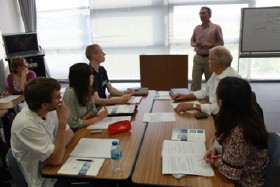
Hybrid solutions introduced by Professor Rolf D. Schlunze |
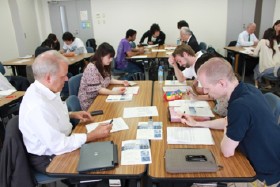
Mr. Carl Eklund from Höganäs Japan with International R+ students |
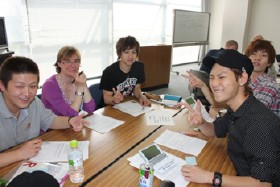
Ms. Karola Japke from Teijin Group in a role play with R+ students |
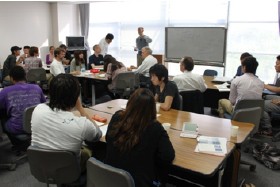
Wrapping-up the results of the role play by Professor William Baber |
2010
Reducing Risk through International Business Communication and Cross Cultural Management
On November 16, 2010, students from the International Business Communication and Cross Cultural Management courses of the Business Administration Department of Ritsumeikan University participated in the fall SIEM Workshop. More than 30 students participated with five managers from international businesses. The workshop was organized with the goal of bringing the classroom theory studied by students into contact with the daily experience of foreign business managers. The students were joined by five managers with international experience:
- Dr. Oliver Siegler, Bayer Pharmaceuticals (Bayer Yakuhin), Osaka;
- Alan Kornhauser, Pabst Brewing, China;
- Karola Japke, Teijin, Osaka
- Takashi Kasagami, BNP Paribas, Tokyo
- Charles Vacher, BNP Paribas, Tokyo
Other participants included Dr. Inga Połeċ (Poland); Sabrina R. (Germany); and Dr. Arto Ojala (Finland). These visitors to the Workshop contributed positively to the cross cultural conversation with their experiences and viewpoints from outside the business world.
Working toward a goal
Students brought interview questions they developed in the classroom based on readings and their own curiosity. Managers responded to the questions allowing students to gather specific information for the reports they will submit later this semester. The students agreed that these were productive interviews, but too short! After the interviews, students proceeded with a role play in which they selected individuals for jobs in a cross cultural workplace. In order to reduce the risk of failure and mismatch, the students had to consider carefully the facts about the hiring company and all the candidates. The role play provoked thinking and discussion on corporate culture, experience, age, language skills that are necessary in a globalized workplace. Although the information was brief due to time limits, the conversation was intensive.
Learning with Diversity
In all, the workshop included more than 10 nationalities with participants from Japan, Indonesia, Germany, Poland, China, Sweden, Brazil, USA, Finland, Thailand, and France.
Student Comments
Students offered numerous positive comments such as these:
- “The role play helped me to…think about something from different perspectives.”
“…made me think logically and reasonably in order to persuade …”
“It was a bit tough but learned a lot.”
“It was really interesting and fun.”
“Good way of learning!”
“I could learn a lot of things from their real experiences!”
Additionally there were some useful constructive critiques, most frequently along the lines of, “We want more time for interviews, role play, etc.” and the need for a clearer resolution of the role play.
“If these students are the future of Japan, it will be splendid”
The participating managers made positive comments such the one above by Mr. Takashi Kasagami. All five managers indicated that they were impressed with the quality of comments from the students. The Fall 2010 workshop was produced by Prof. Will Baber in the absence of Dr. R. Schlunze who was on sabbatical at that time.
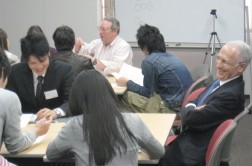
4th SIEM Workshop – Aspire Communication on Hybrid HM Solutions for IHRM
Professor Dr. Rolf Schlunze (Ritsumeikan University) conducted in collaboration with Prof. Will Baber (Kyoto University) a workshop to find new practices for International Human Resource Management in Japan. A developmental approach in Human Resource Management (HRM) has been found within many Japanese corporations. Recently however, a Western style competence approach seems to be gaining momentum, not only at foreign owned firms in Japan. Reconciling Western and Eastern worldviews, not in the form of global convergence but cultural cross-vergence will promote better IHRM. These evolving HRM approaches were discussed in the workshop and potential solutions for HRM in Japan were considered. The aims of the workshop were to understand different cultural approaches in HRM and to think ahead about how to develop appropriate hybrid organizational forms and processes.
The workshop was designed to be mutually beneficial to the participants through an intensive exchange of ideas and practical training. Selected students with a good command of English participated in the workshop as it was held entirely in English. International managers described their experiences implementing HR management strategies in intercultural workplaces. The workshop had three structural elements: a) presentations about challenges of IHRM; b) interviews and open ended role plays; and c) finally a discussion about how to solve HR problems.
The students gave very positive feedback. They appreciated the guest speakers, Mr. Kasagami and Mr. Vacher, who are internationally experienced managers. Conducting role plays with these professionals was seen as real. They appreciated the good opportunity to discuss with both managers who created the hybrid organization company. Ms. Wang Xiyu (Tracy) from China mentioned “I really appreciated this workshop. By listening to the managers and communicating with classmates, I really got a better understanding of cross-culture situation”. Benoit Couvois from France participated in the SIEM workshop again and mentioned that the workshops are always interesting and that Mr. Kasagami and Mr. Vacher are a great example of what can be done in hybrid management.
After the workshop all students were positive about the idea that good IHRM is about creating hybrid solutions where all local and expatriated employees feel integrated. Two French students emphasized that if one wants to create this new kind of cross cultural management solution, systematic thinking and the agreement of all employees is important. They were positive that within the process of globalization, people will find a way to reach a compromise. Most the students believe that standardization and localization can be balanced. A Japanese student found the concept of harmony as helpful to overcome difficulties that matter with globalization issues especially in Japan. The best student report of can be downloaded .
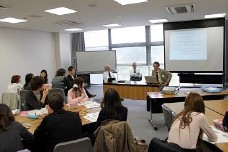
Prof. Rolf Schlunze introduces senior managers Charles Vacher and Takashi Kasagami |
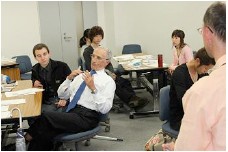
Charles Vacher joins Will Baber’s role play providing a flair of a real business situation |
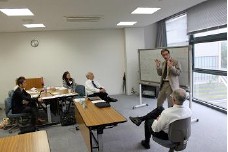
Professor Schlunze concludes regarding hybrid solutions for IHRM |
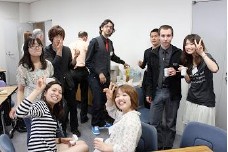
Students show how much they enjoy the workshop |
2009
3rd SIEM Workshop – Short report about the IBC Workshop for collaborative development with international managers
During a workshop which was held at Ritsumeikan Epoch 21 at 14th November 2009 five international managers reflected together with R+ students about challenges how to build good communication strategies overcoming various workplace problems. The workshop had three structural elements: 1. Intercultural encounters – advertising challenges of international business communication, 2. intercultural training with open ended role plays and 3. a guided discussion about how communication problems can be solved. Twenty-nine students participated in the workshop on intercultural business communication investigating options for collaborative development in international human resource management. All students found that they gained idea after participating in the workshop that might help them to achieve intercultural competence. They understood that a successful manager needs to become a good communicator, a good negotiator, and a good networker as well. They learnt from the professional managers about how to create intercultural synergy by collaborative development. An international student concluded that the well organized workshop provided a lab to learn, a lab for our future business life!
Detailed report about to IBC Workshop for collaborative development between international managers and students of international business administration
Prof. Rolf D. Schlunze (Ritsumeikan Univ.), Will Baber (Kyoto Univ.) and Claas Riese (Aspire Communications) organized a workshop entitled “Aspire International Business Communication – Workshop for collaborative development between managers and students of international business administration”.
To give some background information: research showed that international managers often have powerful ideas and are eager to transfer their strategic intent to their local subordinates. However, to do so successfully much learning about the local business culture often is needed but not always achieved. On the other side, our students of international business administration do have a need to learn about those international managers’ visions and experiences in purpose to prepare for their working life in an international workplace. Thus, the idea of the workshop was to work commonly on new solutions promoting successful intercultural business communication. The entire workshop was held in English. Students with a good command in English studying International Business participated. Five international managers have been invited as guest speakers, among them Claas Riese (ASPIRE COMMUNICATIONS), Andreas Stange (TUV-SUD), Nicolas Bocqet (DESOUTTER), Takashi Kasagami and Charles Vacher, (Pacific Financial Partners, LLC). They described their experiences in the intercultural workplace. They indicated specific communication problems. Together with our students they reflected about the challenge to build good communication strategies overcoming various problems during the workshop which was held at Ritsumeikan Epoch 21 at 14th November 2009. The workshop had three structural elements: 1. Intercultural encounters – advertising challenges of international business communication, 2. intercultural training with open ended role plays and 3. a guided discussion about how communication problems can be solved. 29 students participated in the workshop on intercultural business communication investigating options for collaborative development in international human resource management.
Benoit Couvois, a student from France, commented the workshop as an impressive day, a lab to learn, a lab to our future business life! A Chinese student state that it was valuable and will be useful for her future career. A Korean student confessed that he learned about a western-style workshop enjoying for the first time doing a role play! The Japanese student praised that it was very magnificent experience having so many difference nationalities gathered in the workshop.
Asking the students if they believe that they have got an idea after participating in the workshop that might help them to achieve intercultural competence, 24 students clearly stated “Yes”. They gave such reasons as follows: Ms. Li emphasized that she learnt that one needs to understand each other’s culture in purpose to conduct business smoothly. Ms. Feiling said that she good experience of intercultural communication each and obtained many useful things that might help her to make this achievement. A German student, Nicole Bassler, expressed that she learned how theory is transferred into real life. A Korean student, Sung Jing, mentioned that he learned how to negotiate to other people during the workshop. The Japanese student, Aya Emi, noticed that after listening to the international managers` talk, she learned that understanding different cultures is always important. A French student became confident to attempt a career in Japan.
After the workshop students indicated what makes foremost a successful manager. Twenty one believed that a successful manager needs to become a good communicator. They gave following reasons: Ms. Maeda found that communication is key of successful management. A Korean student said “I think successful manager are sure good communicators, they negotiate to workers and motivate them to do business efficiently”. A Danish student, Jakob, added that communication becomes important especially in a culture different to your own. Benoit: Concerning intercultural management that is nothing more compared with communication, it is the basic of everything else in the business world so without it, noting is really possible. Si Feiling found that setting up successful network is only possible with appropriate communication. Interestingly, Ms. Li believes that a successful manager is all of them: a good communicator, good negotiator, and a good networker. He or she should combine these qualities in a preferable way!
We asked the students “Do you believe that collective development can help to create intercultural synergy?” Twenty-two stated “Yes”. A Japanese student found that people who need to adjust to particular situations, might create a collective development it not always synergy. Another Japanese student found that collaborative development needs communication and synergy can be an outcome of this communication. A French student indicated that he learnt from the interview with Mr. Kasagami and Mr. Vacher that two different people who develop their skill together and work closely together can create amazing synergy. Ms. Feiling state that she learnt from the guest speakers explaining about their intercultural synergy, a collaborative development usually works towards very good solutions.
2nd SIEM Workshop – International Human Resources Management (IHRM) Workshop for International Managers and International Students Ritsumeikan University BKC, May 16-17, 2009 Summary Report
Executive Summary
The workshop brought together international businesses and Ritsumeikan students for a unique and powerful exchange. All participants deepened their understanding of issues and solutions in IHRM. All completed the workshop with a higher opinion of Ritsumeikan University and its positive role in business and education.
Workshop contents
A workshop entitled “Going Hybrid – Aspire IHRM Communication” was held on the initiative of Professor Dr. Rolf D. Schlunze, Department of International Management, assisted by William Baber, a BKC language teacher with significant business experience. Claas Riese, a professional management consultant specializing in intercultural communication, lent guidance to the workshop as well. The workshop was held at Ritsumeikan Epoch 21 on the Biwako-Kusatsu Campus. The changing international human resource management (IHRM) approaches in Japan were discussed. The aims of the workshop were as follows:
- Understanding different cultural approaches in IHRM.
- Learning how organizations can be flexible across geography and time.
- Forward thinking about developing appropriate hybrid organizational forms and processes.
The workshop was held entirely in English providing Ritsumeikan undergraduate and graduate students with a powerful opportunity for communicating in English. Participants included business students from Japan, China, France, Sweden and New Zealand all with good command of English. Interacting with these students, business managers from France, Germany and the UK described their experiences implementing IHRM strategies. They took the opportunity to reflect on and reconcile IHRM approaches. The workshop was designed to be mutually beneficial to the participants through an intensive exchange of ideas and practical training. The workshop had three structural elements:
1.Intercultural encounters – Challenges of IHRM
2.Guided discussion – Solving HR problems
3.Intercultural training – Open ended role plays
The workshop builds on theory and discussion in the classroom. Students subsequently report on their understanding of practical and theoretical issues raised in the workshop to the class.
Outcomes among participants
Fourteen student participants and the guest speakers replied to a questionnaire about their experience in the workshop. Their opinions were extremely positive. Specifically:
- All students were firmly positive that they learned concrete material participating in the workshop;
- All students, including foreign students, had an improved overall opinion of Ritsumeikan University after participating in this workshop;
- All students indicated a firm wish to participate in similar workshops and events in the future because they viewed the interaction with professional managers as valuable; and
- All agreed that the material in this workshop was motivating to them.
The three managers who were invited as guest speakers were also positive about the success of the workshop and made statements such as the following:
“I think these workshops are a good initiative. It is of very high importance that the university maintains close contact with industry. Theoretical education should be more synchronized with the fast changing ‘real world’.”
“It was a very interesting workshop …ideas were very insightful. I don’t think there is one right answer, but really different cultures getting together (and cooperating as well) is the part of answer.”
The students provided the following feedback:
- “It seems that two days are very short time for us to discuss about this topic, and I would like to have more time to do interviews with the managers ….”
- “It was a very interesting workshop and I learned very much. I was able to make useful and valuable connections for the future.”
- “We don’t need a manager who just makes things all the same. We need one who can adapt to different situations.”
- “…I learnt a lot about IHRM, which is really an important task for a corporation nowadays.”
- “I got a lot of valuable ideas, either from the guests or the other students. I would like to participate in similar workshops again.”
- “This workshop is full of advice and sharing experiences that are very valuable and give directions for own careers.”
- “I had good experiences of this workshop.”
The questionnaire asked the students “After the workshop do you believe that international human resource management (IHRM) can create hybrid solutions?”Almost all students were positive in their response because during the workshop clear examples were provided. One mentioned that if HRM managers are sure about what they need, “…they should be able to motivate their employees to create an IHRM hybrid model.” These students viewed the creation of such an IHRM model as a necessity. Another student believed that cross-cultural convergence through diversity can create hybrid solutions. Students also saw that the creation depends heavily on how people interact with each other, and they saw the importance of cultural understanding and mutual respect. They trusted that co-workers with different cultural background can be sensitive to each other’s backgrounds and resolve conflicts. The hybrid solution was evaluated as the most efficient solution for IHRM.
We asked our participants “Do you believe that global standardization and localization can be balanced?” From the viewpoint of the students, a balance was seen as a must in order to create a fruitful workplace environment. One student commented: “I think it can be balanced for the rapid development of globalization: seeking common ground while reserving differences is the best rule which makes all parties comfortable and positive.” Another student mentioned that it would be hard to standardize IHRM practices even during globalization, since it is impossible for cultural differences to disappear. Therefore, the balance of global standardization and localization was seen as necessary to achieve efficient management.
One manager responded that, “Achieving this balance remains the greatest task for a multinational company.”Another provided the following insightful statement: “It is getting more obvious that global companies have to pay more attention to regional (local) success factors when structuring their organizations. There is a dilemma between the implementation of the corporate strategy (ensuring company strategies and processes are followed globally), and getting the optimum on a regional (local) basis. This relationship is not trivial and a hybrid HR organization can certainly help achieving the optimum.”
This last statement strikes chord with the organizers of the workshop, Professor Dr. Schlunze, Prof. Baber, and Claas Riese. The IHRM relationship is complex and vital to optimization in international business. The workshop was able to synthesize the viewpoints of business leaders and students, all of whom left the workshop with increased respect for IHRM, each other, and Ritsumeikan University.
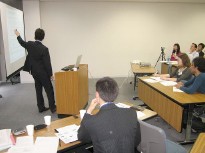
David Sternis (Panasonic) presents about human resource management problems |
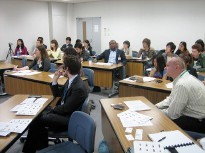
Audience consisting of international and Japanese students listen to presentation |
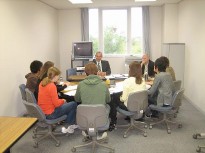
Team interview with managing director of Janfried Tirre (Sauer-Danfoss Daikin) |
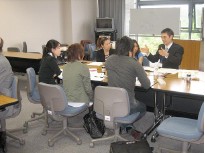
Discussion with Chris Christophers (JAC Recruitment) |
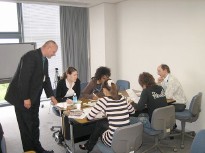
Role play with William Baber and Claas Riese |
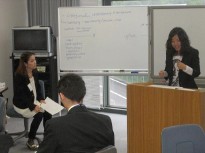
Wrap-up by Ms. Chen, a graduate students from China |
2008
1st Workshop – Intercultural Competence – Workshop for Collaborative Development between Foreign Managers and RU Business Administration Students
A workshop on intercultural competence was held at Epoch 21 at Ritsumeikan University BKC from Saturday morning, 15th November to Sunday noon, 16th November 2008. The idea of the workshop was to enable an exchange of information and opinions between foreign international managers and Japanese students that wish to be employed by foreign multinational enterprises. However, the workshop was much more international due to the participation for foreign students. The workshop was opened by the consultant, Mr. Claas Riese. He guided the participants to conduct a self-analysis searching for successful adjustment strategies. Presentations of five invited international managers followed. Ms. Tomoko Ohmae the head of an American pharmaceutical company was the first speaker. Foreign mangers, such as Mr. Raymond R.Tait (Swissôtel NANKAI), Mr. Michael A. Loefflad (Wuerth), and Dr. Andreas Stange (TUV SUD) introduced their their experiences in the intercultural workplace. Mr. Nabil Khan (SB Assets Management) gave an interesting lecture about cultural differences in his Mexican and Japanese workplace referring to Hofstede a leading scientist in Cross-cultural management. After a lunch break students interviewed the managers. They presented their results the next morning. Will Baber concluded that an important core strategy to develop intercultural competence is to find a reliable informant. Prof. Dr. Rolf D. Schlunze proposed that foreign managers and local employees need to create a hybrid culture enabling to every party to contribute fully in the corporate decision making process. Claas Riese concluded that the search for success strategies is also a search for one`s own personality.
The feedback from our students was very good. Asking them what was most interesting for you about the workshop? They replied that they enjoyed the time when talking and exchanging ideas in an informal and relaxed manner. They reported that they made a new discovery. A student from New Zealand found it interesting that all managers have different ideas and approaches to succeed in the international business. Japanese students realized that having a different culture can be an advantage in negotiation. They learnt that sometimes conflicts are a necessary to make a good relationship with foreigners. Female students appreciated the good advice from the female senior manager about how to work as a woman in a Western company. Some students found it difficult to interview in English, but saw it as a very special learning experience. Our visiting French students enjoyed this seminar and praised it as a good idea. The presentations of the manager and the final discussion about adjustment strategies in the intercultural workplace were appreciated by all students.
Organizer team:
Prof. Rolf D. Schlunze (Ritsumeikan Univ.)
Claas Riese (Aspire Communication)
Will Baber (Ritsumeikan Univ.)

